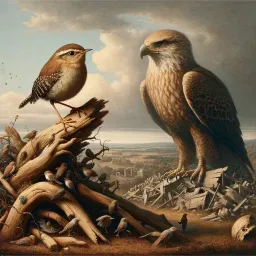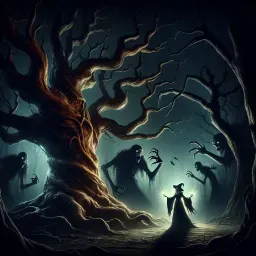”I will wear my heart upon my sleeve for daws to peck at“

0
0
0
0
- Meaning
- This phrase means to openly show one's emotions, making oneself vulnerable to others who may take advantage of these emotions. The comparison to daws (a type of crow) pecking at a heart displays the potential cruelty or judgment that can come from being so transparent with one's feelings. It's a colorful way of expressing the risks involved in being emotionally honest and transparent.
- Allegory
- The person with their heart on their sleeve represents emotional transparency and vulnerability. The crows symbolize potential judgments and exploitations from others, mirroring the phrase "daws to peck at." The serene expression of the person highlights the courage and inner strength in choosing to be emotionally honest. The dual panoramic view in the background symbolizes the contrasting outcomes of such vulnerability: the gloomy scene represents the risks and negative consequences, while the bright, sunny landscape reveals the rewards and virtues of being true to oneself. This contrast aims to evoke a reflective understanding of the bravery and beauty in living openly and authentically.
- Applicability
- Applying the phrase to personal life suggests the importance of balancing emotional honesty with self-protection. While it may be courageous and authentic to share your truest feelings, it's essential to be mindful of those who might exploit your vulnerability. In daily activities, this could translate to being open and sincere in relationships while also setting boundaries to protect oneself from emotional harm.
- Impact
- Shakespeare's phrase has had a significant impact on language and culture, contributing to common expressions about emotional vulnerability. It has inspired countless discussions on the themes of honesty, transparency, and vulnerability in literature, psychology, and everyday discourse. The phrase is often cited in contexts discussing the importance and risks of being emotionally open.
- Historical Context
- The historical context of "I will wear my heart upon my sleeve for daws to peck at" dates back to the early 17th century when Shakespeare wrote "Othello," around 1603-1604. The play reflects the social and cultural tensions of the time, including themes of jealousy, betrayal, and the complexity of human emotions.
- Criticisms
- Criticisms and controversies related to the phrase typically involve interpretations of emotional expression. Some argue that being emotionally transparent is a sign of strength, while others see it as naivety or weakness. The phrase can also be viewed through different lenses depending on cultural values regarding emotional openness and privacy, leading to varied interpretations and potential disagreements.
- Variations
- The phrase has been interpreted and adapted in various cultures. In Western culture, it often signifies emotional openness. In other cultures, where emotional restraint is valued, the phrase might be seen as a cautionary warning about the dangers of displaying emotions too freely. Interpretations vary widely based on societal attitudes towards emotional expression.
-

The empty vessel makes the loudest sound.
-

Give me my robe, put on my crown; I have immortal longings in me.
-

Give sorrow words; the grief that does not speak knits up the o-er wrought heart and bids it break.
-

My tongue will tell the anger of my heart, or else my heart concealing it will break.
-

If you can look into the seeds of time, and say which grain will grow and which will not, speak then to me.
-

Uneasy lies the head that wears a crown.
-

The world is grown so bad, that wrens make prey where eagles dare not perch.
-

The devil can cite Scripture for his purpose.
-

I bear a charmed life.
-

As merry as the day is long.
-

By the pricking of my thumbs, something wicked this way comes.
-

Something is rotten in the state of Denmark.
No Comments